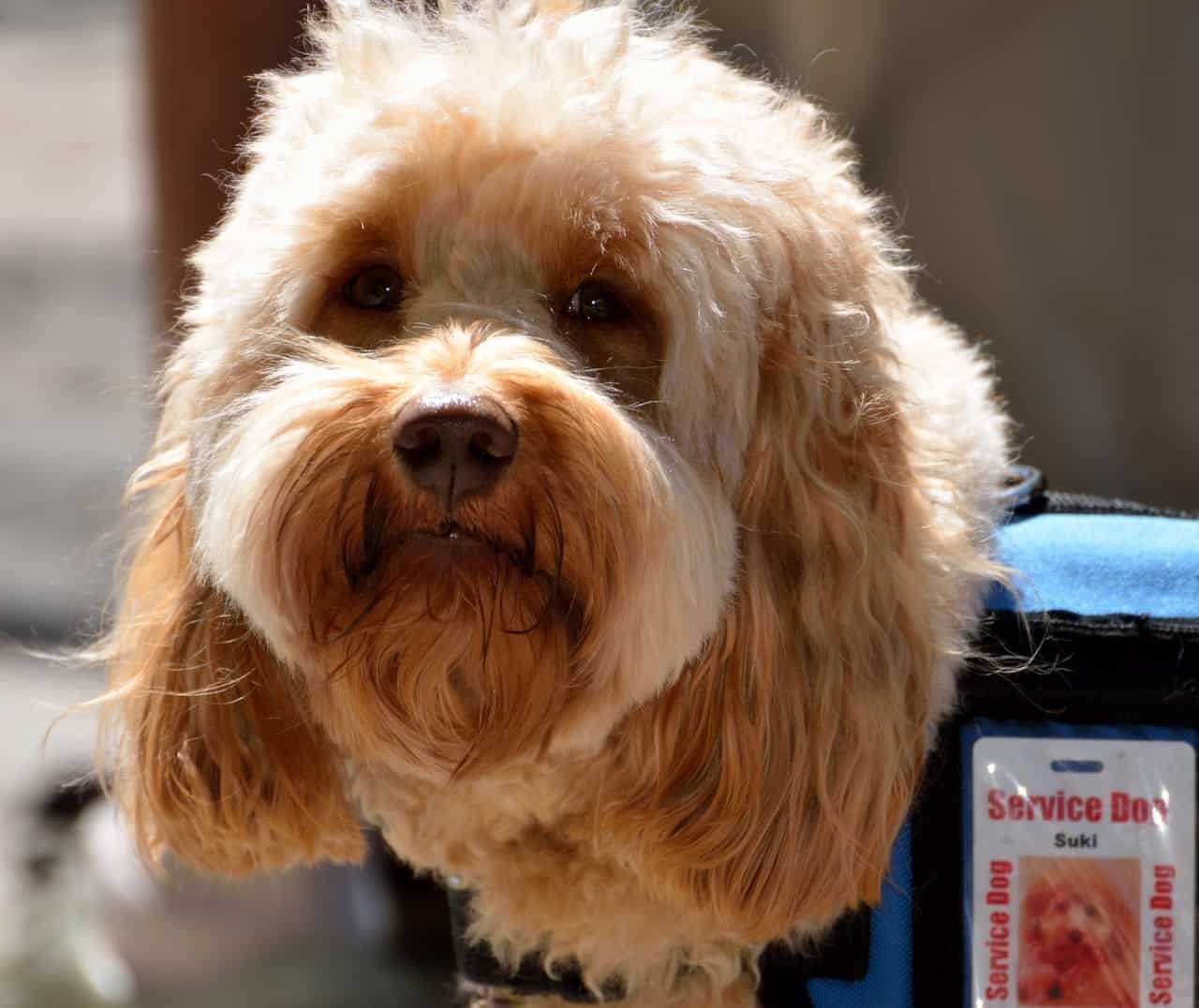We’ve seen Poodles stereotypes as prissy and feminine dogs with fancy cuts. However, that’s far from the truth! This intelligent dog breed is as hardworking as elegant, making them excellent service dogs for people with disabilities.
You can even see Poodles ranking as one of the top breeds to work as service dogs. Read on to learn how Poodles work as service animals and why they are an excellent aide to people.
Do Poodles Make Excellent Service Dogs?
Short answer, yes, Poodles make excellent service dogs, but to an extent. This friendly breed is ideal for people with disabilities relating to mental, hearing, or visual conditions. But given their smaller size, even Standard Poodles don’t meet the physical requirements to perform specific roles, such as pulling wheelchairs for mobility-impaired owners.
That said, there are various needs that the Standard Poodle and Miniature Poodle can meet excellently for individuals with disabilities, such as those with:
- Mental health disabilities
- Hearing or visual impairments
- People with allergies or diabetes
- Those with seizures for immediate oncoming seizure response
If you require service animals for more physical and heavier tasks, then you’ll benefit from bigger service dog breeds like the German Shepherd or Golden Retriever. But beyond the physical needs, Poodles make excellent service animals that meet a wide range of needs.
The Service Traits Poodles Have
Every dog breed carries unique qualities that make them great service dogs. For Poodles, they possess the following traits:
- High intelligence levels
- Ease of training
- Eager to please and learn
- Loyal and affectionate
- Obedient
- Friendly and people-oriented
- Attentive and focused
- Great sense of smell
- Excellent retrieving skills
All those traits are essential when owning a service dog. Let’s delve deeper into these poodle traits.
Poodle Intelligence and Obedience
The breed must learn efficiently during special training sessions. A professional service dog trainer must teach these dogs to work well when detecting life-threatening allergies, seizures, a spike or dip of blood sugar levels, anxiety attacks. Professional trainers will teach dogs to behave appropriately with their pet owners.
Because Poodles are intelligent, obedient, and eager to please, they will hone their skills and learn commands quickly. Also, remember that people bred Poodles as natural retrievers and truffle hunters, giving them an excellent sense of smell that can detect things rapidly, like low blood sugar based on your breath! Not only do Poodles have a fantastic sense of smell, but their retrieving skills will have them easily fetch and pick up things for their owners, which is a desirable trait in service dogs for disabled people.
With the Poodle’s eagerness to please, you have a dependable service dog that strives to serve you and will do anything for you. That is a great trait you can’t find in some dog breeds. Dog breeds will serve well, but they won’t seem as natural as a Poodle, who can naturally serve their owners with love.
Poodle Affection and Loyalty
We know Poodles to attach to their owner quickly. This loving dog breed will create solid bonds with its owners, lending their loyalty. Loyalty is a crucial trait you must look for in a service dog, as you need a dog who will always be present and have the desire to assist.
While the Poodle will form a great bond with its owner, this breed won’t easily bond with strangers. Poodles are friendly, but you can find many distancing themselves a bit from unfamiliar faces, though there’s nothing to worry about regarding any aggressive behavior. Poodles eventually warm up and act friendly to strangers once they deem these unfamiliar faces trustworthy.
The Poodle’s social behavior is another outstanding trait because it will mean your dog stays by your side with full attention to its owner.
Poodles Hate Loneliness
Poodles are prone to separation anxiety as they hate being alone at home. These dogs love being part of anything their owner or entire family does.
Poodles will love being a companion and working for their owner. When you spend more time with a Poodle service animal and become more dependent on him, he will be happier, thriving off serving you.
Poodle Care Requirements
While Poodles make excellent service dogs, they have a few caveats that may not make them suitable for some owners.
One thing potential owners must consider when owning a poodle is their high grooming and exercise requirements.
Poodles require daily brushing, along with regular baths and trims. This active dog breed requires mental and physical exercise daily for about 60 minutes a day. Meeting these requirements can be challenging for those with conditions that prevent moving around and exerting too much energy.
If you believe you can’t keep up with the Poodle’s daily grooming and regular exercise needs, you might look towards a lower-maintenance breed. But if you are ready for what it takes to own a Poodle or have family members in the household who can meet the dog’s care requirements, you can proceed with the steps of acquiring one as your service animal.
How to Get a Poodle Service Dog
As you can see, Poodles possess desirable traits that make them suitable services dogs. The Poodle’s only impairment is their size, unless you require their service-oriented characteristics rather than to meet specific physical needs.
Before learning how to get a Poodle service dog, we want to mention this:
Please don’t confuse service animals with comfort or emotional support animals. Service dogs are dogs trained to perform acts to help those with ailments and disabilities.
For those who have a Poodle and plan to train him into becoming a service dog, you register him.
If you don’t have a Poodle right now, the process is simple.
Many organizations specialize in training service animals, with their dogs available for adoption. Service Dogs Inc. and Little Angels Service Dogs are well-known organizations, but you can also find organizations within your community through searching online and asking around.
Of course, meet specific qualifications and submit requirements before you can adopt a pre-trained poodle service dog.
For starters, you need to show proof of your condition. You can ask your doctor for a medical certificate for submission. Doing so will let the organization know you require a service dog.
Afterward, the adoption process is relatively similar to adopting a dog in your local shelter. You may need to undergo a screening process and interview, then pay a small adoption fee. Once you can take your Poodle service dog home, purchase appropriate pet supplies and prepare your dog’s space beforehand so he can feel comfortable upon arriving in his new home.
Training a Poodle to Become a Service Dog
Alternatively, you can train your poodle to become your service dog!
Qualified service dogs must first undergo specific training that directly benefits the owner’s disability. The training content would vary based on the person’s special needs or disability.
You can hire a trainer, send your Poodle to a training center, or teach the dog yourself using a training plan and program! However, taking your Poodle to professional schools or trainers if you’re not well-knowledgeable about training a dog is a good idea.
Once you have successfully trained your dog, he will need to undergo a public access test to see whether he is calm and obedient in public. The test will show if your Poodle is up to helping his owner out with the tasks.
After passing the public access test, your dog can receive a service dog certification.
You can show this certification when traveling or in public areas, but doing so is not required by law. But because many staff from establishments still ask for this, it’s best to keep accessories and documents to signal you have a service dog. That way, you lessen any risk of staff disallowing your dog from entering or from people holding your dog while he’s at work.



